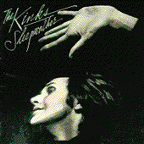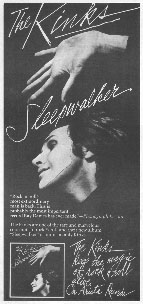- Home
- Introduction, Update Information, Links
- The Super Seventies "Classic 500"
- Readers' Favorite Seventies Albums
- Seventies Single Spotlight
- The Top 100 Seventies Singles
- Favorite Seventies Artists In The News
- Seventies Almanac - Year By Year
- Seventies Singles - Month By Month
- Seventies Albums - Month By Month
- Seventies Daily Music Chronicle
- Seventies Superstars In Their Own Words
- The Super Seventies Archives
- Seventies Trivia Quizzes & Games
- Seventies MIDI Jukebox
- The Super Seventies Bookstore
- The Super Seventies Photo Gallery
- Seventies' Greatest Album Covers
- Popular Seventies Movies & TV
- Seventies Celebrity Portrait Gallery
- Seventies Lyrics Hit Parade
- Top Seventies Artist Music Videos
- Seventies Usenet Music Forums
- Seventies Smiley Calendar
- EXTRA!
- Superseventies.com Facebook Page
- Superseventies.com Reddit Discussions
- The Super Seventies Blog
- Tweet The Seventies
- RockSite InfoBank
- Beatlefan Site
- Thanks For Your Support! / Top Sellers
- Search The Rock Site/ The Web

Sleepwalker
The Kinks
Arista AL 4106
Released: February 1977
Chart Peak: #21
Weeks Charted: 16
 Even as a staunch Kinks supporter, I was beginning to have my doubts. Although the band's following has grown steadily since they made it into the Seventies (by the skin of their teeth) with "Lola," they seemed to have peaked with Muswell Hillbillies.
Ray Davies seemed hopelessly stuck no a thematic dead-end street (perhaps he'd started believing all those notices about personifying the "voice of the little people"). But Sleepwalker
-- the first Kinks' album since Lola
that's unencumbered by either a horn section or female vocal chorus -- is a clear-cut triumph both for Davies and the band.
Even as a staunch Kinks supporter, I was beginning to have my doubts. Although the band's following has grown steadily since they made it into the Seventies (by the skin of their teeth) with "Lola," they seemed to have peaked with Muswell Hillbillies.
Ray Davies seemed hopelessly stuck no a thematic dead-end street (perhaps he'd started believing all those notices about personifying the "voice of the little people"). But Sleepwalker
-- the first Kinks' album since Lola
that's unencumbered by either a horn section or female vocal chorus -- is a clear-cut triumph both for Davies and the band.
A few of these songs smack of the self-righteousness that's hindered Davies' recent writing; but the beautiful "Stormy Sky," in which clouds become a symbol for romantic conflict, and "Full Moon," a scary tune about madness and loss of self-recognition, are among his best efforts. The recurrent themes are fear, depression and failed utopianism; in "Life Goes On," we are warned that "life'll hit you when you least expect it." Yet in the end, there always remains a faint glimmer of hope: "Take that frown off your head/'cause you're a long time dead." "Juke Box Music," which seems strangely set apart from the rest, is the best song here, a rocker about a woman whose entire life is spent living inside the story lines of her favorite records. It should be a pathetic song, yet Davies has us tapping our feet, singing along.
The Kinks' playing on Sleepwalker is easily their most powerful since Lola. Dave Davies' aggressive guitar work is pushed into the forefront, and the intensity of his lead work seems to rouse the entire group. One is continually reminded just what a fine and forceful band the Kinks can be as those ethereal falsetto backing vocals, so long dormant, rise again like the spirit of "Sunny Afternoon" and "Waterloo Sunset."
- Billy Altman, Rolling Stone, 4/21/77.
Bonus Reviews!There's something extraordinarily potent about cheap music, as a character in a Noël Coward play once observed. One could have said much the same thing about Kinks albums at times, just as once one might have made a case for Ray Davies as a sort of latter-day Sir Noël. Unfortunately, Sleepwalker, the latest effort from Davies and the Kinks, continues the decline in quality that Kinks albums have been demonstrating for at least five years now (with the possible exception of Preservation Act One ). And again the decline must be counted as Ray's responsibility, brother Dave having long since abandoned his own songwriting efforts. For better or worse, the Kinks are a one-man show now.
The album is just... well, uninvolving. Where in the past Ray gave us concise, compassionate little stories about little lives and everyday tragedies, today he seems content merely to rail at obvious targets in the most banal language ("Mr. Big Man") or to deal obsessively with his own psychological concerns, which, frankly, are not more interesting than yours or mine or the average rock star's. Why this is I can't say, except that perhaps the Kinks' commercial success has in some way closed him off from the sorts of people he used to bring to life so vividly. At any rate, here are nine tracks, all of which go on far too long (the best Davies songs were always under three minutes) a few clever lines that remind one that there is talent lurking about here somewhere, and the usual high level of performance from the boys in the band.
I had the misfortune to listen to this album just after seeing another equally British production, Richard Lester's Robin and Marian, with Sean Connery and Audrey Hepburn. I cried like a baby almost throughout it, and I was reminded that once upon a time, far too long a time ago, certain Kinks' songs had the same effect on me. As cheap music goes, Sleepwalker is not very potent.
- Steve Simels, Stereo Review, 5/77.
The Kinks get back to basics in this debut LP for Arista, and the result is one of the most accessible LPs, both thematically and musically that they have come up with in years. This is not a concept album, although some of the songs have a similar restless night theme. Nor is the LP as cynical and pessimistic as some of the Kinks' earlier efforts. In fact, it's almost optimistic. And the Kinks, as a band, have rarely sounded better.
- Billboard, 1977.
Without Raymond Douglas Davies, the Kinks would be rather ordinary. They have a reputation for sloppy stage performances and a persistent rumor is that on their early hits, they used studio musicians to play the licks they couldn't handle. Davies' ironic sensibility and his rare ability as a lyricist transform the band's every record into a big event, as they say on TV. He is given to producing song cycles on everything from the mercenary world of pop music to the transformation of English village life. He's into transformations again on Sleepwalker, but this time out, he's singing about the strange changes people go through when the sun goes down. The title song is a vampire's comment on his life. "Full Moon" is a reassuring look at lycanthropy: "Pay no attention if I crawl across the room. It's just another full moon." "Mr. Big Man" is about other changes, the ones people go through when they hit the top and realize they can treat others as badly as they please. "Life Goes On" is a cheerful reminder that "Life will hit you when you least expect it" and even suicide won't help much. When you're dead and gone, life will still go on and on.
Lest you take his playful wickedness too seriously, Davies throws in a reminder that what he's singing is only "Juke Box Music": "It's only meant to dance to, so you shouldn't take it to heart."
- Playboy, 6/77.
Ray Davies' temporary abandonment of theatrical concepts may have ruined his show, but it's freed him to write individually inspired songs again. It's also freed his band to play up to its capacity, which unfortunately falls midway between professional virtuosity and amateur fun. Doubly unfortunate, at least half the songs are in a similar range. Recommended: "Jukebox Music" and "Full Moon." B-
- Robert Christgau, Christgau's Record Guide, 1981.
For their first release on Clive Davis's Arista label, The Kinks ditched the concept albums, and knuckled down to a workmanlike, but unexceptional batch of songs. "Full Moon" and "Juke Box Music" are among the stronger tracks. * * *
- Rick Clark, The All-Music Guide to Rock, 1995.
Ray Davies piddled away most of the Seventies doing cornball theatrical pieces like Preservation Act 2 and The Kinks Present a Soap Opera, driving off whatever was left of the audience. But the band had a strange comeback as mullet-mongering arena rockers, aiming for the American mainstream with smarmy novelty hits. Sleepwalker is erratic, but it hits a high point in the rueful groove of "Juke Box Music."
- Rob Sheffield, Rolling Stone, 6/19.
![]() Reader's Comments
Reader's Comments
ThePrisoner
Compared to what the fellow sixties artists were doing in 77, this was well done. The Stones and Who were now just mocking themselves and the former Beatles seemed burned out. The Kinks in comparison were still pushing it. God Save the Kinks!
![]() Main Page
| Readers' Favorites
| The Classic 500
| Other Seventies Discs
| Search The RockSite/The Web
Main Page
| Readers' Favorites
| The Classic 500
| Other Seventies Discs
| Search The RockSite/The Web




